- Home
- James Herriot
James Herriot's Dog Stories Page 5
James Herriot's Dog Stories Read online
Page 5
‘Thank you, thank you very much indeed,’ Tristan said in a flat voice, still looking straight to his front.
Siegfried looked at him narrowly for a moment, then turned away. ‘Right then, clear away this rubbish and let’s get to bed.’
My bedroom and Tristan’s were connected by a door. Mine was the main room, huge, square, with a high ceiling, pillared fireplace and graceful alcoves like the ones downstairs. I always felt a little like a duke lying there.
Tristan’s had been the old dressing-room and was long and narrow with his small bed crouching at one end as if trying to hide. There were no carpets on the smooth, varnished boards so I laid the dog on a heap of blankets and talked down soothingly at Tristan’s wan face on the pillow.
‘He’s quiet now – sleeping like a baby and looks as though he’s going to stay that way. You’ll be able to have a well-earned rest now.’
I went back to my own room, undressed quickly and got into bed. I went to sleep immediately and I couldn’t tell just when the noises started next door, but I came suddenly wide awake with an angry yell ringing in my ears. Then there was a slithering and a bump followed by another distracted cry from Tristan.
I quailed at the idea of going into the dressing-room – there was nothing I could do, anyway – so I huddled closer into the sheets and listened. I kept sliding into a half sleep then starting into wakefulness as more bumping and shouting came through the wall.
After about two hours the noises began to change. The Labrador seemed to have gained mastery over his legs and was marching up and down the room, his claws making a regular tck-a-tck, tck-a-tck, tck-a-tck on the wooden floor. It went on and on, interminably. At intervals, Tristan’s voice, hoarse now, burst out. ‘Stop it, for Christ’s sake! Sit down, you bloody dog!’
I must have fallen into a deeper sleep because when I awoke the room was grey with the cold light of morning. I rolled on to my back and listened. I could still hear the tck-a-tck of the claws but it had become irregular as though the Labrador was strolling about instead of blundering blindly from one end of the room to the other. There was no sound from Tristan.
I got out of bed, shivering as the icy air of the room gripped me, and pulled on my shirt and trousers. Tiptoeing across the floor, I opened the connecting door and was almost floored as two large feet were planted on my chest. The Labrador was delighted to see me and appeared to be thoroughly at home. His fine brown eyes shone with intelligence and well-being and he showed rows of glittering teeth and a flawlessly pink tongue in a wide, panting grin. Far below, the tail lashed ecstatically.
‘Well, you’re all right, chum,’ I said. ‘Let’s have a look at that wound.’ I removed the horny paws from my chest and explored the line of stitches over the ribs. No swelling, no pain, no reaction at all.
‘Lovely!’ I cried. ‘Beautiful. You’re as good as new again.’ I gave the dog a playful slap on the rump which sent him into a transport of joy. He leaped all over me, clawing and licking.
I was fighting him off when I heard a dismal groan from the bed. In the dim light Tristan looked ghastly. He was lying on his back, both hands clutching the quilt, and there was a wild look in his eyes. ‘Not a wink of sleep, Jim,’ he whispered. ‘Not a bloody wink. He’s got a wonderful sense of humour, my brother, making me spend the night with this animal. It’ll really make his day when he hears what I’ve been through. Just watch him – I’ll bet you anything you like he’ll look pleased.’
Later, over breakfast, Siegfried heard the details of his brother’s harrowing night and was very sympathetic. He condoled with him at length and apologised for all the trouble the dog had given him. But Tristan was right. He did look pleased.
I keep stressing the fact that animals are unpredictable things, and, indeed, this unpredictability is at the heart of much of my writing. One aspect of this is their varied reaction to anaesthetics. I understand that some human patients burst into song or come out with unprintable language. This dog just howled, and, of course, the incident is etched particularly deeply in my memory because poor Tristan was so closely involved. It is one of the things he and I laugh about now. The whole story gives me a nostalgic twinge with the recollection that in those days we would bring a patient into our sitting-room and even into our bedroom to look after him. We still like to think that we give personal attention, but I doubt if it will ever go as far as that again.
3. A Triumph of Surgery
I was really worried about Tricki this time. I had pulled up my car when I saw him in the street with his mistress and I was shocked at his appearance. He had become hugely fat, like a bloated sausage with a leg at each corner. His eyes, bloodshot and rheumy, stared straight ahead and his tongue lolled from his jaws.
Mrs Pumphrey hastened to explain. ‘He was so listless, Mr Herriot. He,seemed to have no energy. I thought he must be suffering from malnutrition, so I have been giving him some little extras between meals to build him up. Some calfs foot jelly and malt and cod liver oil and a bowl of Horlick’s at night to make him sleep – nothing much really.’
‘And did you cut down on the sweet things as I told you?’
‘Oh, I did for a bit, but he seemed to be so weak I had to relent. He does love cream cakes and chocolates so. I can’t bear to refuse him.’
I looked down again at the little dog. That was the trouble. Tricki’s only fault was greed. He had never been known to refuse food; he would tackle a meal at any hour of the day or night. And I wondered about all the things Mrs Pumphrey hadn’t mentioned: the pate on thin biscuits, the fudge, the rich trifles – Tricki loved them all.
‘Are you giving him plenty of exercise?’
‘Well, he has his little walks with me as you can see, but Hodgkin has been down with lumbago, so there has been no ring-throwing lately.’
I tried to sound severe. ‘Now I really mean this. If you don’t cut his food right down and give him more exercise he is going to be really ill. You must harden your heart and keep him on a very strict diet.’
Mrs Pumphrey wrung her hands. ‘Oh I will, Mr Herriot. I’m sure you are right, but it is so difficult, so very difficult.’ She set off, head down, along the road, as if determined to put the new regime into practice immediately.
I watched their progress with growing concern. Tricki was tottering along in his little tweed coat; he had a whole wardrobe of these coats – warm tweed or tartan ones for the cold weather and macintoshes for the wet days. He struggled on, drooping in his harness. I thought it wouldn’t be long before I heard from Mrs Pumphrey.
The expected call came within a few days. Mrs Pumphrey was distraught. Tricki would eat nothing. Refused even his favourite dishes; and besides, he had bouts of vomiting. He spent all his time lying on a rug, panting. Didn’t want to go walks, didn’t want to do anything.
I had made my plans in advance. The only way was to get Tricki out of the house for a period. I suggested that he be hospitalised for about a fortnight to be kept under observation.
The poor lady almost swooned. She had never been separated from her darling before; she was sure he would pine and die if he did not see her every day.
But I took a firm line. Tricki was very ill and this was the only way to save him; in fact, I thought it best to take him without delay and, followed by Mrs Pumphrey’s wailings, I marched out to the car carrying the little dog wrapped in a blanket.
The entire staff was roused and maids rushed in and out bringing his day bed, his night bed, favourite cushions, toys and rubber rings, breakfast bowl, lunch bowl, supper bowl. Realising that my car would never hold all the stuff, I started to drive away. As I moved off, Mrs Pumphrey, with a despairing cry, threw an armful of the little coats through the window. I looked in the mirror before I turned the corner of the drive; everybody was in tears.
Out on the road, I glanced down at the pathetic little animal gasping on the seat by my side. I patted the head and Tricki made a brave effort to wag his tail. ‘Poor old lad,’ I said, ‘you haven�
��t a kick in you but I think I know a cure for you,’
At the surgery, the household dogs surged round me. Tricki looked down at the noisy pack with dull eyes and, when put down, lay motionless on the carpet. The other dogs, after sniffing round him for a few seconds, decided he was an uninteresting object and ignored him.
I made up a bed for him in a warm loose box next to the one where the other dogs slept. For two days I kept an eye on him, giving him no food but plenty of water. At the end of the second day he started to show some interest in his surroundings and on the third he began to whimper when he heard the dogs in the yard.
When I opened the door, Tricki trotted out and was immediately engulfed by Joe the Greyhound and his friends. After rolling him over and thoroughly inspecting him, the dogs moved off down the garden. Tricki followed them, rolling slightly with his surplus fat but obviously intrigued.
Later that day, I was present at feeding time. I watched while Tristan slopped the food into the bowls. There was the usual headlong rush followed by the sounds of high-speed eating; every dog knew that if he fell behind the others he was liable to have some competition for the last part of his meal.
When they had finished, Tricki took a walk round the shining bowls, licking casually inside one or two of them. Next day, an extra bowl was put out for him and I was pleased to see him jostling his way towards it.
From then on, his progress was rapid. He had no medicinal treatment of any kind but all day he ran about with the dogs, joining in their friendly scrimmages. He discovered the joys of being bowled over, trampled on and squashed every few minutes. He became an accepted member of the gang, an unlikely, silky little object among the shaggy crew, fighting like a tiger for his share at meal times and hunting rats in the old hen house at night. He had never had such a time in his life.
All the while, Mrs Pumphrey hovered anxiously in the background, ringing a dozen times a day for the latest bulletins. I dodged the questions about whether his cushions were being turned regularly or his correct coat worn according to the weather; but I was able to tell her that the little fellow was out of danger and convalescing rapidly.
The word ‘convalescing’ seemed to do something to Mrs Pumphrey. She started to bring round fresh eggs, two dozen at a time, to build up Tricki’s strength. For a happy period there were two eggs each for breakfast, but when the bottles of sherry began to arrive, the real possibilities of the situation began to dawn on the household.
It was the same delicious vintage that I knew so well and it was to enrich Tricki’s blood. Lunch became a ceremonial occasion with two glasses before and several during the meal. Siegfried and Tristan took turns at proposing Tricki’s health and the standard of speech-making improved daily. As the sponsor, I was always called upon to reply.
We could hardly believe it when the brandy came. Two bottles of Cordon Bleu, intended to put a final edge on Tricki’s constitution. Siegfried dug out some balloon glasses belonging to his mother. I had never seen them before, but for a few nights they saw constant service as the fine spirit was rolled around, inhaled and reverently drunk.
They were days of deep content, starting well with the extra egg in the morning, bolstered up and sustained by the midday sherry and finishing luxuriously round the fire with the brandy.
It was a temptation to keep Tricki on as a permanent guest, but I knew Mrs Pumphrey was suffering and after a fortnight, felt compelled to phone and tell her that the little dog had recovered and was awaiting collection.
Within minutes, about thirty feet of gleaming black metal drew up outside the surgery. The chauffeur opened the door and I could just make out the figure of Mrs Pumphrey almost lost in the interior. Her hands were tightly clasped in front of her; her lips trembled. ‘Oh, Mr Herriot, do tell me the truth. Is he really better?’
‘Yes, he’s fine. There’s no need for you to get out of the car – I’ll go and fetch him.’
I walked through the house into the garden. A mass of dogs was hurtling round and round the lawn and in their midst, ears flapping, tail waving, was the little golden figure of Tricki. In two weeks he had been transformed into a lithe, hard-muscled animal; he was keeping up well with the pack, stretching out in great bounds, his chest almost brushing the ground.
I carried him back along the passage to the front of the house. The chauffeur was still holding the car door open and when Tricki saw his mistress he took off from my arms in a tremendous leap and sailed into Mrs Pumphrey’s lap. She gave a startled ‘Ooh!’ and then had to defend herself as he swarmed over her, licking her face and barking.
During the excitement, I helped the chauffeur to bring out the beds, toys, cushions, coats and bowls,, none of which had been used. As the car moved away, Mrs Pumphrey leaned out of the window. Tears shone in her eyes. Her lips trembled.
‘Oh, Mr Herriot,’ she cried, ‘how can I ever thank you? This is a triumph of surgery!’
Tricki Woo again and a delightful example of treating the individual animal with time to enjoy the rewards. The story also brings back one of the warmest memories of the camaraderie at Skeldale House when we shared out Mrs Pumphrey’s goodies. Readers will be pleased to learn that from that time on, Tricki’s diet was kept on a sensible basis so that there was no more obesity or crackerdog.
4. Have a Cigar
I looked again at the slip of paper where I had written my visits. ‘Dean, 3 Thompson’s Yard. Old dog ill.’
There were a lot of these ‘yards’ in Darrowby. They were, in fact, tiny streets, like pictures from a Dickens novel. Some of them opened off the market-place and many more were scattered behind the main thoroughfares in the old part of the town. From the outside you could see only an archway, and it was always a surprise to me to go down a narrow passage and come suddenly upon the uneven rows of little houses with no two alike, looking into each other’s windows across eight feet of cobbles.
In front of some of the houses a strip of garden had been dug out and marigolds and nasturtiums straggled over the rough stones; but at the far end the houses were in a tumbledown condition and some were abandoned with their windows boarded up.
Number three was down at this end and looked as though it wouldn’t be able to hold out much longer.
The flakes of paint quivered on the rotten wood of thedoor as I knocked; above, the outer wall bulged dangerously on either side of a long crack in the masonry.
A small, white-haired man answered. His face, pinched and lined, was enlivened by a pair of cheerful eyes; he wore a much-darned woollen cardigan, patched trousers and slippers.
‘I’ve come to see your dog,’ I said, and the old man smiled.
‘Oh, I’m so glad you’ve come, sir,’ he said. ‘I’m getting a bit worried about the old chap. Come inside, please.’
He led me into the tiny living-room. ‘I’m alone now, sir. Lost my missus over a year ago. She used to think the world of the old dog.’
The grim evidence of poverty was everywhere. In the worn-out lino, the fireless hearth, the dank, musty smell of the place. The wall-paper hung away from the damp patches and on the table the old man’s solitary dinner was laid: a fragment of bacon, a few fried potatoes and a cup of tea. This was life on the old-age pension.
In the corner, on a blanket, lay my patient, a cross-bred Labrador. He must have been a big, powerful dog in his time, but the signs of age showed in the white hairs round his muzzle and the pale opacity in the depth of his eyes. He lay quietly and looked at me without hostility.
‘Getting on a bit, isn’t he, Mr Dean?’
‘Aye he is that. Nearly fourteen, but he’s been like a pup galloping about until these last few weeks. Wonderful dog for his age is old Bob, and he’s never offered to bite anybody in his life. Children can do anything with him. He’s my only friend now – I hope you’ll soon be able to put him right.’
‘Is he off his food, Mr Dean?’
‘Yes, clean off, and that’s a strange thing because by gum, he could eat. He always sat by me
and put his head on my knee at meal times, but he hasn’t been doing it lately.’
I looked at the dog with growing uneasiness. The abdomen was grossly distended and I could read the telltale symptoms of pain: the catch in the respirations, the retracted commissures of the lips, the anxious, preoccupied expression in the eyes.
When his master spoke, the tail thumped twice on the blankets and a momentary interest showed in the white old eyes; but it quickly disappeared and the blank, inward look returned.
I passed my hand carefully over the dog’s abdomen. Ascites was pronounced and the dropsical fluid had gathered till the pressure was intense. ‘Come on, old chap,’ I said, ‘let’s see if we can roll you over.’ The dog made no resistance as I eased him slowly on to his other side, but, just as the movement was completed, he whimpered and looked round. The cause of the trouble was now only too easy to find.
I palpated gently. Through the thin muscle of the flank I could feel a hard, corrugated mass; certainly a splenic or hepatic carcinoma, enormous and completely inoperable. I stroked the old dog’s head as I tried to collect my thoughts. This wasn’t going to be easy.
‘Is he going to be ill for long?’ the old man asked, and again came the thump, thump of the tail at the sound of the loved voice. ‘It’s miserable when Bob isn’t following me round the house when I’m doing my little jobs.’
‘I’m sorry, Mr Dean, but I’m afraid this is something very serious. You see this large swelling. It is caused by an internal growth.’
‘You mean . . . cancer?’ the little man said faintly.
‘I’m afraid so, and it has progressed too far for anything to be done. I wish there was something I could do to help him, but there isn’t.’

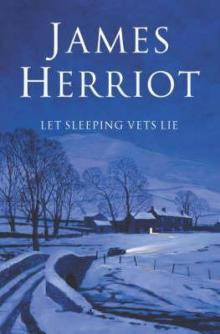 Let Sleeping Vets Lie
Let Sleeping Vets Lie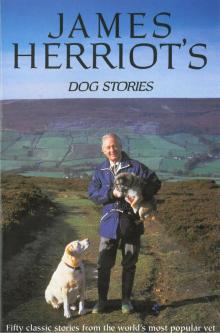 James Herriot's Dog Stories
James Herriot's Dog Stories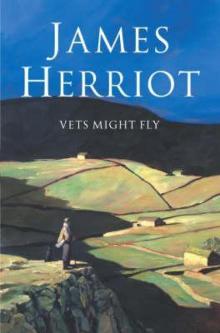 Vets Might Fly
Vets Might Fly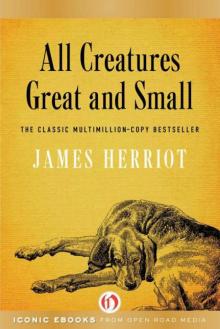 All Creatures Great and Small
All Creatures Great and Small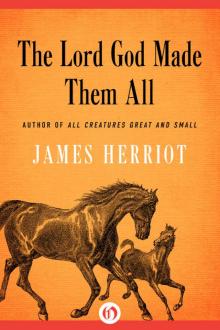 The Lord God Made Them All
The Lord God Made Them All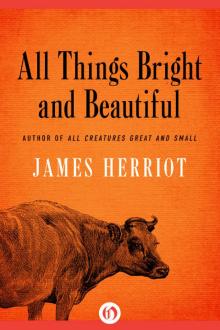 All Things Bright and Beautiful
All Things Bright and Beautiful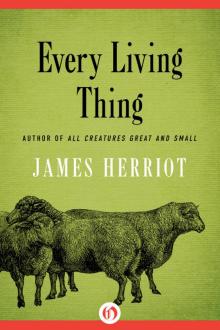 Every Living Thing
Every Living Thing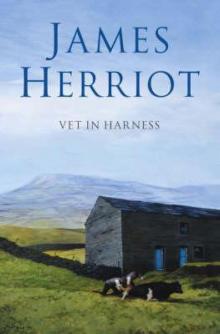 Vet in Harness
Vet in Harness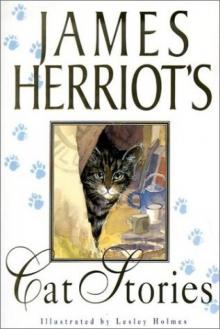 James Herriot's Cat Stories
James Herriot's Cat Stories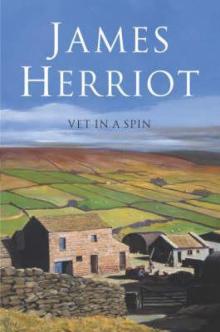 Vet in a Spin
Vet in a Spin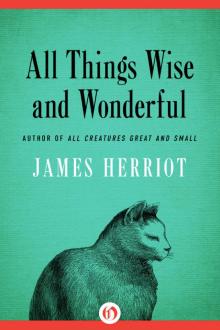 All Things Wise and Wonderful
All Things Wise and Wonderful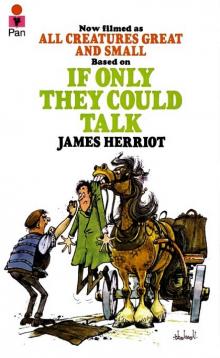 If Only They Could Talk
If Only They Could Talk